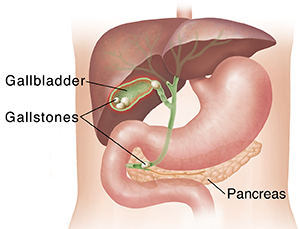Understanding Pancreatitis
If your pancreas suddenly becomes irritated or inflamed, you have acute pancreatitis. Acute pancreatitis is often very painful. Emergency medical treatment is usually needed. Chronic pancreatitis is a condition where your pancreas remains inflamed. It can lead to pain and other complications.
Symptoms of acute pancreatitis
Symptoms include:
Treating acute pancreatitis
If you have acute pancreatitis, you may be in the hospital for a few days. For part of this time, you likely won’t be allowed to eat or drink. This lets your pancreas rest and heal. If your pancreatitis is bad, you may get nutrition and fluids through a feeding tube. Medicines are given to help ease pain.
Causes of pancreatitis
Gallstones are 1 of the most common causes of pancreatitis. These hard stones form in the gallbladder, an organ located near the pancreas. These 2 organs share a passage into the small intestine called the common bile duct. But fluid can't leave the pancreas if gallstones block this duct. The fluid backs up and causes pancreatitis. Alcohol is also a very common cause of pancreatitis. Certain medicines, injury, and infection can also cause pancreatitis. Problems with the structure of the pancreas may also be a cause. Genetic factors can also cause pancreatitis.

If you have chronic pancreatitis
If the pancreas stays inflamed for a long time, chronic pancreatitis may result. Common symptoms include diarrhea, weight loss, and belly pain. Possible complications of chronic pancreatitis include:
Treatment for chronic pancreatitis includes: